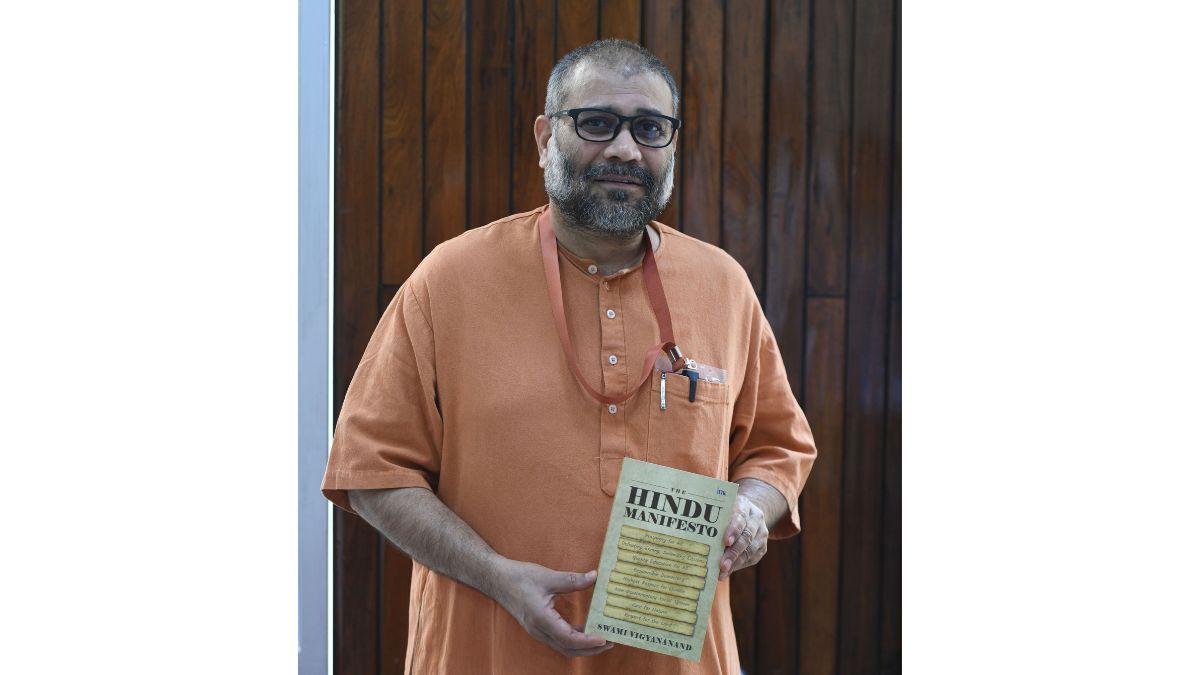'The Hindu Manifesto' book review: A vision for ethical nation-building focused on traditional Hindu values

Victory in war is seen as a noble pursuit: it is not just about physical conquest, but is also a reflection of one's skill, valour and adherence to duty. Victory in war, particularly when fighting for a just and noble cause, such as defending the nation, contributes to the security and stability of society and the nation.
These words echo in the chapter—defeating enemy, defending citizens—of the new book ‘The Hindu Manifesto’ written by Swami Vigyananand, joint general secretary of the Vishwa Hindu Parishad, a front organisation of the Rashtriya Swavyamsevak Sangh (RSS). Swami Vigyananand, an IIT graduate-turned-monk has penned a treatise drawing knowledge from sacred books, vedas and other classical hindu texts.
With a name similar to election time promises made by political parties, the book offers more. As it was released by RSS chief Mohan Bhagwat recently, it hinted at the book’s importance as a guiding text.
If the Communist Manifesto codified communism's dominant philosophy, the Hindu Manifesto attempts to draw a framework for a Hindu society rooted in timeless Hindu values and principles. This thought-provoking work is structured around eight 'Hindu Sutras', presented as the foundational and civilisational pillars requisite for building a strong, ethical, and prosperous nation.
The book quotes extensively from classical Sanskrit texts, with accompanying notes, translations and explanations.
ALSO READ | ‘Nalanda: How It Changed the World’ book review: Compelling and deeply researched account
The eight sutras list four key foundations essential to any nation’s resilience: economic strength, national security, quality education, and responsible democracy. Vigyananand stresses that economic prosperity must be inclusive and ethical, supporting entrepreneurs, farmers, and wealth creators while avoiding exploitative capitalism. He advocates for fair economic policies that uplift all sections of society.
Defence and security are equally prioritised. The manifesto underlines the importance of a well-prepared military, modern intelligence systems, and the strategic foresight needed to protect citizens from both external and internal threats. A particular chapter emphasises that the victory of the armed forces and the decisive defeat of adversaries are imperative for preserving sovereignty and protecting citizens.
“A well-planned strategic approach is essential for overcoming the enemy, ensuring that military operations are executed with precision, foresight, and adaptability. The effectiveness of military leadership-encompassing commanders, the commander-in-chief and soldiers-is a crucial factor in achieving success on the battlefield, Their skills, discipline and morale directly influence the outcome of conficts, making their training, well-being and overall care a national priority,” the book says.
Education, according to Vigyananand, is not merely about academic achievement, but about nurturing ethical, capable, and morally-grounded citizens. The fourth foundational pillar—democracy—is explored through the lens of ancient Indian republican traditions, including the concept of the Ram Rajya. The author calls for a democratic system driven by ethical leadership, citizen participation, and unwavering commitment to public welfare.
The latter part of the book transitions to the four civilisational values that sustain national character: respect for women, social equality, care for nature, and pride in one’s land and heritage. The author eloquently argues that the status of women in a country was the true measure of a civilisation's advancement. The manifesto makes a strong case for gender equality, education for women, and strict justice in cases of crimes against them.
On the issue of caste and discrimination, the book provides a nuanced historical account. It challenges colonial-era and Western narratives about the caste system, clarifying that traditional varna and jati were occupational, not hierarchical. The text champions the idea of a just society that respects all individuals, regardless of background.
Environmental stewardship is another central theme. The manifesto emphasises that true progress is impossible without ecological balance. Drawing on Vedic and Hindu traditions, Vigyananand promotes a lifestyle of responsible consumption and deep reverence for nature.
Finally, the sutra on patriotism encourages citizens to take pride in their land and uphold the cultural and moral values that have sustained Indian civilisation for millennia.
ALSO READ | 'The Indian Constitution: Conversations with Power' review: A bold critique of power and democracy
'The Hindu Manifesto' offers more than just commentary: it proposes a comprehensive framework for ethical governance, cultural revival, and social harmony, aiming to inspire a Hindu renaissance, a call for civilisational resurgence.
The author has presented it as a moral and cultural blueprint for any society that seeks to harmonise material progress with ethical governance and spiritual depth. The ideas are firmly grounded in the ancient cultural traditions of India, yet presented in a manner that is accessible to modern readers. It deserves attention not just from policymakers and intellectuals, but also those who want to understand the hindu thought philosophy.
The Hindu Manifesto
Author: Swami Vigyananand
Publisher: Blueoneink
Pages: 409
Price: ₹699
Books Review